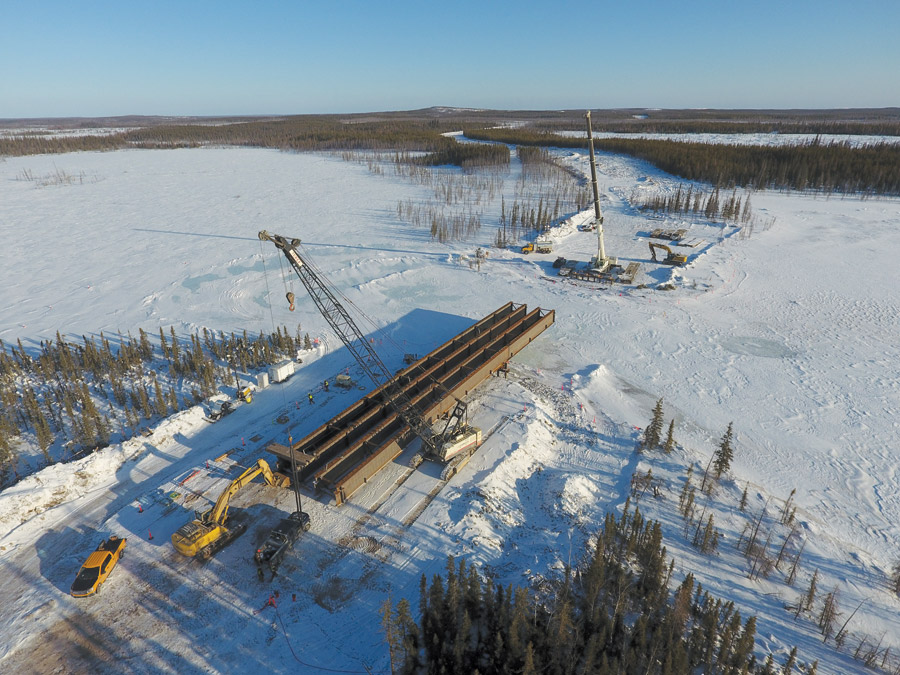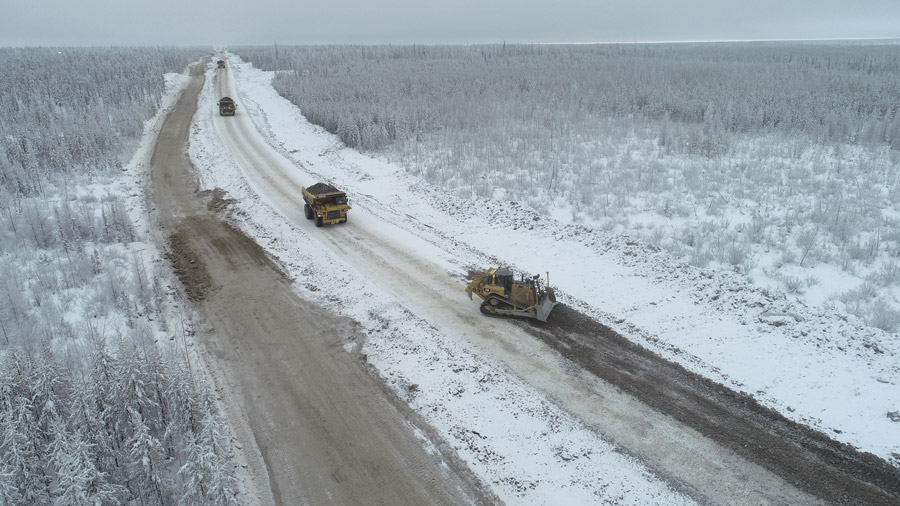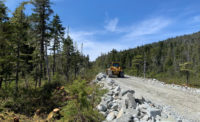ENR 2023 Global Best Projects
Best Road/Highway and Project of the Year Finalist - Tłı̨chǫ All Season Road

Workers faced terrain that featured discontinuous permafrost, muskeg and saturated soils with poor drainage, plus temperatures that sometimes reached -50° C.
Photo courtesy Kiewit
Tłı̨chǫ All Season Road
Tlicho Region, Northwest Territories, Canada
Best Project, Project of the Year Finalist
Submitted by: Peter Kiewit Sons ULC
Owner: Government of the Northwest Territories
Lead Design Firm: Hatch Corp.
General Contractor: Peter Kiewit Sons ULC
Construction Partners: Tłıchǫ-Kiewit General Partnership (TKGP); Tłıchǫ Investment Corp.
Equity & Service Provider: Kiewit Canada Development Corp.
Equity Partners: Tłıchǫ Government; North Star Infrastructure GP
Consultants: Kiewit Infrastructure Engineers; Thurber; Tetratech; Associate Engineers
A flat muskeg maze-like landscape laced with ponds and streams isolated Whatì—a remote settlement of the Tłı̨chǫ First Nations people in Canada’s Northwest Territories—for much of the year.
The community of 540 residents, about 700 miles north of Edmonton on the southeastern shore of Lac La Martre, depended on a winter-only ice road. It was “vulnerable to fluctuating climate conditions as much of its alignment was constructed on frozen lakes,” says Sonia Idir, senior communications officer in the Northwest Territories infrastructure department. And in recent years, the winter road functioned for shorter periods, due to climate change.
That has changed, thanks to a request for an all-season road to the Northwest Territories government from the Tłı̨chǫ leadership. The resulting two-lane gravel highway is a 28-year public-private partnership, with Kiewit as concessionaire.
The 97-km road is designed for speeds of up to 80 kph and includes 15 water crossings. Construction started in August 2019 and the road opened in November 2021. Workers faced terrain that featured discontinuous permafrost, muskeg and saturated soils with poor drainage, plus temperatures that at times reached -50° C.

Workers faced terrain that featured discontinuous permafrost, muskeg and saturated soils with poor drainage, plus temperatures that sometimes reached -50° C.
Photos courtesy Kiewit

The project exceeded the 35% requirement for Tłı̨chǫ residents’ participation. Some of the Tłıchǫ crew had prior experience as equipment operators, from working in the local diamond mines, says Alfonz Nitsiza, the Tłı̨chǫ chief of Whatì.
Two work camps were established for the project. For some of the indigenous employees, it was their first experience living away from home, which called for additional support by managers. Kiewit coordinated with a community liaison to host sessions with local hires onsite and within the villages to discuss “camp life” expectations. Public town hall meetings, both in person and virtual, were held four times a year during the construction period to address issues in the community.
The COVID-19 pandemic occurred early in construction, forcing Kiewit to find ways to minimize impacts to the project schedule and costs. Workers took longer shifts, ate meals and stayed with the same group of “shiftmates” to minimize any spread of COVID-19 and maintain the project’s schedule.
Accelerated bridge construction techniques and materials were implemented to complete the critical new LaMartre River Crossing during the 2020 winter period.

Workers followed procedures to ensure no equipment operators disturbed wildlife. When groups of bison crossed the site, construction crews paused.
Photos courtesy Kiewit

The alignment was entirely within the Wek’èezhìi Management Area, a large region without a land-use plan in place, and also crossed Tłı̨chǫ lands where various agreements and constitutionally protected rights had to be respected. Throughout the construction phase, traditional hunters, trappers and fishers had limited access to the project area. Kiewit staged construction activities to avoid traditional sites, including cabins, trails, cultural sites and traplines.
Sensitivity to the natural environment was important. When tree clearing equipment was operating, “workers were required to walk a kilometer ahead of the machines to ensure no wildlife would be at risk,” says Bruno Pigeon, the project manager for Kiewit. “Stockpiles had to be managed to avoid bank swallows nesting in the construction area.”

Given the remote location and 97-km-long alignment, safety and readiness was key.
Photo courtesy Kiewit
Crews would call sightings of various animals on the radio to warn traffic and maintain a safe distance. “The bison interrupted the work [on occasion] as they travel in herds and sometimes stopped on our road for hours,” says Robert Cornell, Kiewit’s project director.
North Star Infrastructure and the Tłı̨chǫ government hold 80% and 20% investment shares in the project with the government of the Northwest Territories. North Star is a consortium of Kiewit Canada Development Corp., and the Tłı̨chǫ government, with Peter Kiewit Sons ULC, Hatch Corp. and Thurber Engineering Ltd. as design and engineering partners. The project cost of $310 million includes construction, operation and maintenance for 25 years.
The highway’s benefit to the community has been substantial, providing access to medical care and other modern conveniences. Residents can now go by vehicle to Yellowknife to buy goods and attend cultural and sports activities. “The cost of living here is so high,” says Nitsiza. “Ordering some goods delivered by plane was expensive.”




